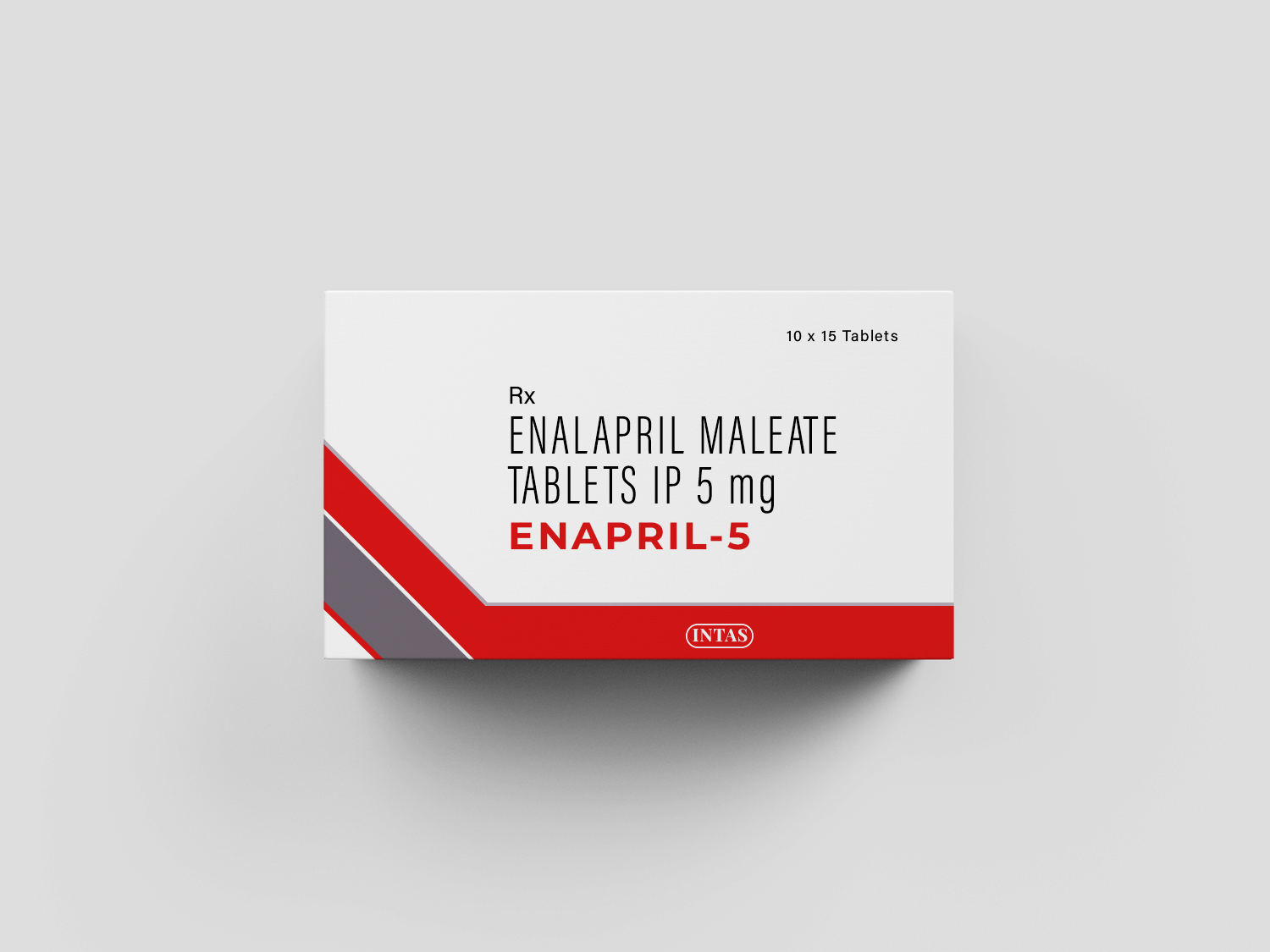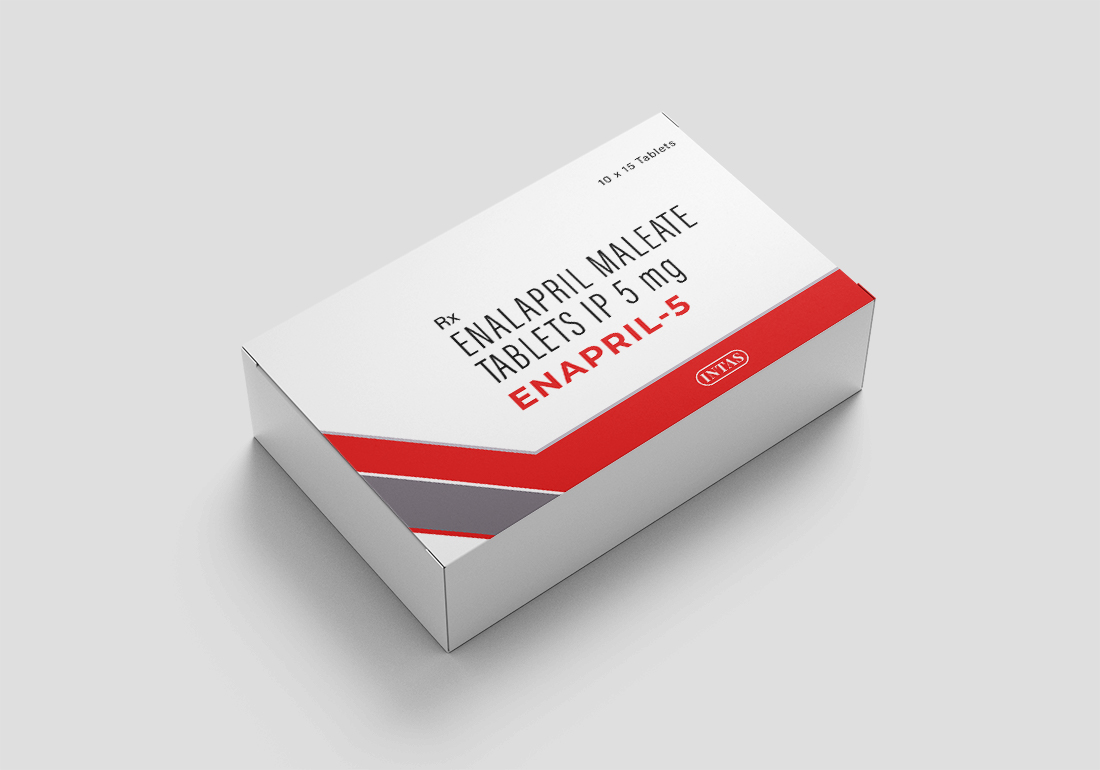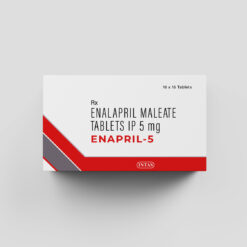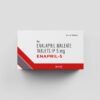Enapril Tablet
$65.00 – $435.00
Enapril is an angiotensin-converting enzyme (ACE) inhibitor. It is most commonly used to treat heart problems and high blood pressure and lowers the risk of having a stroke or heart attack. It is also taken after a heart attack. ACE inhibitors are used for the treatment of coronary diseases as well as cardiovascular issues. In the case of hypertension, ACE inhibitors like Enapril can be used with other antihypertensives.
Description
| Active Ingredient | Enalapril |
| Type | High Blood Pressure |
How Does Enapril Work
The medicine works by widening the blood vessels and pumping more blood throughout the body. It does so by blocking angiotensin II, which occurs naturally in the body. Angiotensin II narrows the arteries in your body, increasing blood pressure. Angiotensin II tightens the blood vessels, while ACE inhibitors like Enapril help relax them. By preventing the formation of ACE, the medicine helps lower blood pressure, reducing the risk of having a heart attack or stroke.
Uses of Enapril
Enapril has multiple uses, both immediate and long-term.
- Helps control blood pressure and hypertension
- Treats physical effects of anxiety
- Treatment after a heart attack
- Preventing stroke and heart attack
- Treatment of heart failure
Recommended Dosage
Enapril should be taken once daily. Enapril 2.5 mg is recommended for people weighing under 50 kg, and 5 mg is recommended for those above 50 kg. It can be taken by itself and along with other medications as long as there are no harmful interactions. Enapril should be taken at a fixed time every day for maximum benefits. Do not stop taking the medication without consulting a physician, as your condition could start to get worse if the treatment is stopped. As mentioned earlier, it is safe for long-term use. Enapril can be taken before or after a meal, as your doctor recommends. Your medical condition will determine the frequency at which you use the medicine. Avoid taking this medicine with alcohol, as your blood pressure may get too low. Inform your doctor about any severe side effects.
Overdose
In case of an overdose, contact your physician or go to the nearest hospital immediately. The symptoms of an Enapril overdose are as follows:
- Extreme sleepiness
- Dizziness
- Pounding heartbeat
Do not drive under such circumstances. ACE inhibitor overdose may lead to severe hypotension.
Side effects
Side effects of Enapril are generally not severe or long-lasting and should not cause any major discomfort. Common side effects are:
- Cough
- Increased potassium level
- Weakness or fatigue
- Dizziness
- Low blood pressure
- Nausea
- Headache
- Change in taste
If the symptoms persist over time, consult a physician. As your body adjusts to the medicine, the side effects should lessen and eventually disappear.
Some side effects are severe and should not be ignored. Although these are rare, they can interrupt your daily life and cause serious harm if left unattended. Alert your doctor immediately if you notice any of the following problems:
- Allergic reaction
- Swelling or red and peeling skin
- Tinnitus (ringing in ears)
- Jaundice
- Heart attack or stroke
- Low blood cell count or bone marrow depression
Drug Interactions
Avoid taking the following medications if you are taking Enapril:
- Any medicine used to treat high blood pressure
- Potassium supplements, spironolactone, aldosterone
- Trimethoprim and co-trimoxazole
- Lithium, amitriptyline, desipramine, nortriptyline, imipramine
- Clozapine, aripiprazole, risperidone or quetiapine
- Amphetamine
- Allopurinol
- Ibuprofen, methotrexate, gold therapy
- Rosiglitazone, metformin, vildagliptin, gliclazide, insulin
- Celecoxib, paracetamol, aspirin
- Racecadotril
- Procainamide
- Sacubitril/ valsartan fixed-dose combination
- Anistreplase, reteplase, or streptokinase
- Ciclosporin, sirolimus, everolimus
- Heparin
Important Advisory
Before using Enapril, make sure to take a few precautions to avoid any harmful interactions. Inform your physician about your medical history and any medication you may be taking at the moment. In case of any of the following circumstances, please inform your doctor before taking Enapril:
- Any sickness, such as nausea and vomiting
- Neutropenia, anemia, thrombocytopenia
- Blood vessel problems
- Diabetes
- Diarrhea
- Any collagen vascular disease
- Age (above 65)
- Any plans for surgery or plan to receive anesthetics due to circumstances
- Pregnancy, as the medicine may be harmful.
Additionally, be careful to remember the following once you have taken or are planning to take Enapril:
- Do not consume alcohol along with the medication.
- Avoid use immediately after childbirth. Although the medication is considered safe for use during breastfeeding as it does not harm the baby, you should consult your doctor before taking it.
- Driving is unsafe as your alertness may be lower. The medication can make you sleepy and dizzy.
- Patients with kidney disease must use it with caution. Their blood pressure, kidney function, and potassium level must be monitored.
- Patients with liver problems or any liver disease must also exercise caution. Inform a healthcare professional immediately if you notice yellow skin and eyes, white stool, or excessive fatigue.
Frequently Asked Questions (FAQs)
1. What not to eat when taking Enapril?
Ans: Enapril can increase the level of potassium in your blood. High potassium levels can lead to heart problems, such as an irregular heartbeat. It is better to avoid food products that are high in potassium such as green leafy vegetables, bananas, or salt with potassium in it.
2. Will Enapril lower my heart rate?
Ans: Enapril is an ACE inhibitor that lowers blood pressure. It helps pump blood to the body. It relaxes the blood vessels and does not affect the heart rate much. It can also increase your tolerance to exercise.
3. Can I buy Enapril over the counter?
Ans: Enapril is prescribed by a doctor to treat high blood pressure or heart failure. You must consult a healthcare professional first to get a prescription for the medicine.
4. How fast will Enapril work?
Ans: Enapril widens your blood vessels and makes it easier for your heart to pump blood. This effect takes around an hour to set in. Thus, Enapril starts to work within an hour, and the effects may last for 24 hours.
References:
- https://www.ncbi.nlm.nih.gov/pmc/articles/PMC2464381/
- https://www.ncbi.nlm.nih.gov/books/NBK431051/
- https://www.ncbi.nlm.nih.gov/books/NBK430896/
- https://pubmed.ncbi.nlm.nih.gov/16216963/
Disclaimer
HisBlue is not a substitute for professional medical care or advice from your doctor. The health information on the HisBlue website is general and provided for your information only. We have ensured our content is accurate and current, with reviews by expert doctors. However, we cannot guarantee its accuracy or timeliness. This information is not meant to replace the diagnosis, treatment, or judgement of your doctor or another qualified healthcare provider.
Disclaimer
HisBlue is not a substitute for professional medical care or advice from your doctor. The health information on the HisBlue website is general and provided for your information only. We have ensured our content is accurate and current, with reviews by expert doctors. However, we cannot guarantee its accuracy or timeliness. This information is not meant to replace the diagnosis, treatment, or judgement of your doctor or another qualified healthcare provider.









Reviews
There are no reviews yet